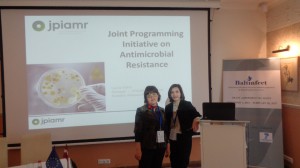On 19 May 2015, MEPs adopted a resolution to tackle the increase of drug-resistant diseases. The recommendations, written by Italian MEP Piernicola Pedicini (EFDD), welcomed the Joint Programming Initiative on Antimicrobial Resistance (JPIAMR). The AMR initiative allows Member States to agree on research needs to avoid duplication, and calls for increased alignment of research funding to combat antimicrobial resistance.
“25,000 citizens die every year in Europe owing to the growing resistance to existing antimicrobials, so we must stimulate research into new types of substances. In the veterinary sector, online sales of antimicrobials and their prophylactic use should be prevented”, said Pedicini further emphasizing the need for the JPI to align research efforts in a holistic manner.
“We are very pleased that JPIAMR’s work is recognised at a political level and that research has been highlighted as crucial in the combat against AMR,” said Mats Ulfendahl, Chair of JPIAMR’s Management Board. “Innovative collaborative research into understanding all areas of resistance is the only way to ensure sustainable solutions,” he continued.
Human antibiotics: diagnose before prescribing
The measures proposed to ensure that antibiotics are used more responsibly include:
- strictly prohibiting their use without prescription,
- requiring a microbiological diagnosis before prescribing antibiotics,
- implementing marketing practices designed to prevent conflicts of interest between producers and prescribers, and
- improving information on the monitoring of antimicrobial consumption and antimicrobial resistance and infection control.
MEPs also urge pharmaceutical companies to invest in developing new antimicrobial agents, and ask the European Commission to consider proposing a “legislative framework” to encourage the development of new antibiotic drugs.
Veterinary antibiotics: restrict preventive use
MEPs also advocate responsible use of antimicrobials in veterinary medicine, including medicated feed, by allowing their use only for treatment after veterinary diagnosis.
The use of veterinary antibiotics should therefore gradually be restricted to therapeutic purposes, by progressively eliminating their use for prophylactic ones. The use of metaphylaxis, i.e. the mass medication of animals to cure sick ones on farms whilst preventing the infection of healthy ones, should also be kept to a minimum, say MEPs.
The resolution was adopted with 637 votes for, 32 against and 10 abstentions.
More information:
